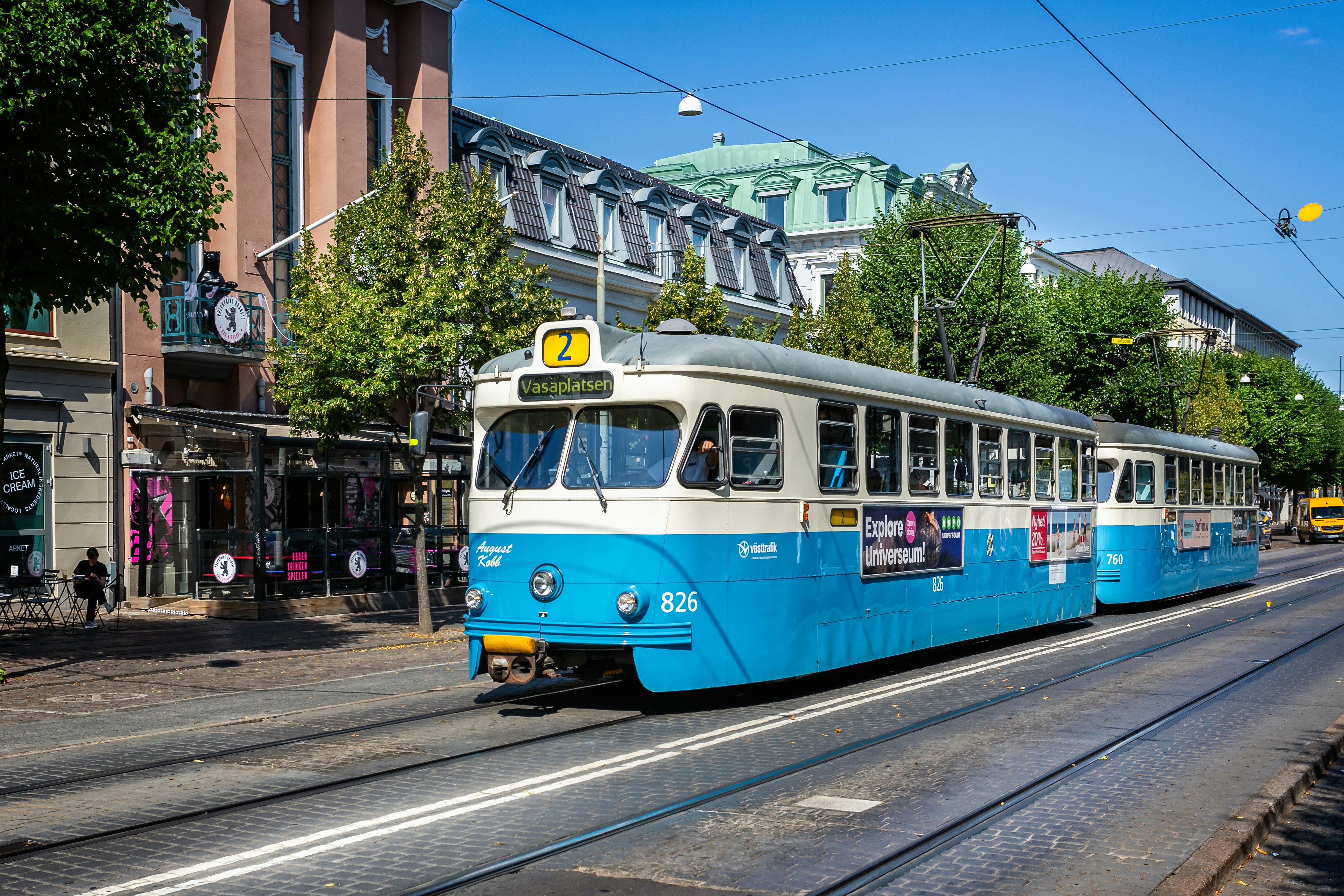
Stretch your kronor with these tips for budget travel in Sweden

Feb 25, 2022 • 10 min read

Sweden’s extraordinary national parks – including Sarek, in Lapland – always cost nothing to explore © Johner Images / Getty Images
Let’s start with the obvious: Sweden is an expensive place. Still, that doesn’t mean your trip has to break the bank.
There are plenty of ways to bring costs down without affecting your enjoyment of everything this stunning, diverse country has to offer; all it takes is a bit of flexibility and planning. From accommodations and transportation to dining and sightseeing, here are our tips for how to experience Sweden without spending a fortune.
Consider less-traveled airports
Arlanda Airport, just north of Stockholm, is Sweden’s biggest hub and the entry point for most international air travelers. For many visitors, it makes the most sense in terms of both convenience and cost. However, depending on your itinerary, it may be worth looking into alternatives, especially if you will be spending time in western or southern Sweden. Landvetter Airport in Gothenburg (Göteborg) is the country’s second largest, with direct flights from many European cities, as well as a few from Africa and the Middle East. If you’re headed to Skåne, consider flying into Copenhagen and taking the Øresundståg train across the Øresund Bridge. It takes just 25 minutes from Copenhagen Airport to Malmö Central Station, with trains continuing up Sweden’s west coast to Gothenburg or northeast as far as Karlskrona, Växjö and Kalmar. There are also high-speed rail connections from Malmö to Stockholm and other points north.
Travel in the shoulder season
Sometimes you don’t have much choice of when to travel. Throughout Sweden, some seasonal summer attractions are only open from June to August, and if you want to experience natural phenomena like the midnight sun or the Northern Lights, you’ll need to visit at the right time of year.
If your plans are more general, however, the shoulder seasons from mid-April through May and September to mid-October are a good bet for decent weather and lower prices at many accommodations. If you’re heading to ski areas, avoid the period between mid-February and the first week of March, when Swedish schools have their winter breaks and resorts fill up with families.
Join membership programs for accommodation discounts
Found all over Sweden, hostels welcome travelers of all ages and provide some of the country’s most affordable accommodations. The Swedish Tourist Association (STF), which operates 250 diverse hostels, hotels, guest houses, cabins and mountain stations all over the country, is an excellent resource as you plan your trip. If you plan to stay at more than a few STF properties, it’s worth joining the organization to get access to reduced member rates at accommodations. You can join in advance or at the first STF property you visit; you’ll recoup the cost of the membership after about a week’s worth of overnights.
There are also many Swedish hostels that are not part of the STF network, including the popular Generator Hostel near Stockholm’s central train station.
If you opt for hotels over hostels, it’s worth signing up for free membership programs. Scandic, Best Western and Nordic Choice Hotels are three of the largest chains in Sweden, and each has a membership program that provides discounted rates as well as various other benefits.

Save on train travel
Among the many ways to get around Sweden, the train might be the most appealing. Sweden’s rail network is extensive, efficient and generally a comfortable and reasonably priced way to traverse the country. While you can often buy a train ticket at the last minute, even for long-distance journeys, many fares are cheaper if you book well in advance, especially for longer trips. Tickets can be purchased online through the national railway company, SJ, or through a mobile app. If these options fail, you can also buy tickets at stations. If you plan to do a lot of train travel, purchasing an Interrail or Eurail Pass before you arrive in Sweden will save you the most money.
Students, young people under the age of 26, and senior citizens (65 and up) can often score great last-minute deals on SJ’s website; these tickets must be purchased within 24 hours of departure. Students and those aged 26 and under are also eligible for a 15-percent discount on regular train fares with a valid International Student ID Card (ISIC) or a Swedish student card. Seniors receive 10 percent off all regular fares with ID.
Take the bus
Long-distance buses may not be as fast as trains, but they’re significantly cheaper and almost as comfortable. FlixBuss and Vy Buss are the two main companies, serving a vast array of destinations, with restrooms and wi-fi on board. There are also various smaller regional bus companies.
Buy a city transit pass
If you’re planning to make extensive use of urban or regional public transportation, a transit pass will help you make the best use of your money. In Stockholm and the surrounding area, single-use travelcards are available for 24 or 72 hours and include buses, the metro, commuter trains and some passenger ferries. Alternatively, you can pay 20 kronor ($2.15) for a reusable SL Access card that can be loaded with a wider range of travelcards or pay-as-you-go funds, or download the smartphone app “SL-Reseplanerare och biljetter” to get tickets and travel cards in mobile form.
Similarly, in Västra Götaland, the region that includes Gothenburg, you can save money by purchasing a 24- or 72-hour ticket valid for unlimited travel. In southernmost Sweden, Skånetrafiken also offers unlimited-ride tickets valid for 24 hours, 30 days or 10 days within a 30-day period.

Fuel up at breakfast and dine in
Swedish hotels are known for having some of the most bountiful breakfast buffets you’ll find anywhere, so you can easily load up your plate with enough food to keep you going for many hours. Many hostels also have breakfast available (though there may be a separate cost). Alternatively, many hostels have common kitchen areas where you can prepare your own meals instead of dining out. Even if you don’t have access to kitchen facilities, larger supermarkets often have salad bars or a decent selection of ready-to-eat food items that you can fill up on for less than the cost of a restaurant meal.
Eat out at lunchtime
Dining out in Sweden is expensive, yet there’s one easy way to keep restaurant meals from breaking the bank: take advantage of daily lunch specials, which are widely available and filling enough to make them your main meal. For around 100 kronor ($11) there’s usually a choice of two or three plated entrees with a side dish or two, often with a drink, bread and a salad bar included as well. Look for the words “Dagens lunch,” which you’ll often see advertised on pavement signboards.
Another good option is to head to a market hall – saluhall – where you can find numerous food vendors under a single roof, many serving daily lunch specials and to-go meals. In Stockholm, there are market halls at Hötorget, Östermalmstorg and Medborgarplatsen on Södermalm; other cities with popular market halls include Gothenburg, Malmö, Lund and Västerås.
Drink strategically
To put it bluntly, alcohol is pricey in Sweden, and you’ll quickly run up quite a tab if you order drinks at restaurants and pubs. That said, it is possible to get a reasonably priced bottle of beer during happy hour, usually called “afterwork” in Swedish (er... Swenglish). The timing of these vary but typically runs from mid- or late afternoon to early evening.
Another option is to skip ordering a drink out and head instead to the nearest branch of the Swedish national liquor store Systembolaget, where you can stock up on beer, wine and other alcohol for a relatively reasonable price. Remember to bring your passport or national ID card to prove you’re at least 20 years of age, and be aware that all branches of Systembolaget are closed on Sundays.
On a different note, Sweden has some of the cleanest drinking water in the world, so there’s really no reason to ever buy a bottle of water. Bring a reusable water bottle and fill it up at any sink. You’ll save money and reduce your impact on the environment at the same time.
Take a free walking tour
A guided walking tour is a perfect way to discover Sweden’s pedestrian-friendly cities and learn a bit of history as well. A variety of free tours are available in Sweden’s three largest cities, Stockholm, Gothenburg and Malmö, as well as in the historic university cities of Uppsala and Lund. Note that while there is no cost to take these tours, it’s good form to tip as generously as you are able, as the guides receive no salary.

Visit free museums
Stockholm has more than a dozen top-notch museums (not to mention other attractions) that are completely free of charge. You can explore the city’s medieval past at Medeltidsmuseet, delve into its more recent history at Stockholms Stadsmuseum, learn about Swedish royal history at Livrustkammaren or discover the secrets of the Vikings and gape at the glittering Gold Room at Historiska Museet. Art lovers won’t want to miss Nationalmuseum and Moderna Museet (the latter also has a branch in Malmö).
In Gothenburg, free attractions include Världskulturmuseet (the Museum of World Cultures), Naturhistoriska Museet (the Natural History Museum) and the contemporary art museum Göteborgs Konsthall.
Beyond the largest cities, there are endless free attractions in Sweden, from informative Naturum (visitor centers) at national parks and other protected areas to fascinating local history museums and a plethora of art museums and galleries. You’ll also find a variety of free open-air and living history museums such as Gamla Linköping, Vallby Friluftsmuseum, Wadköping and Västergötlands Museum.
Get a city attractions pass
If you’re in Stockholm or Gothenburg and are planning to visit numerous attractions in a short period of time, you may be able to save money by buying a Go City Pass. Available for 1, 2, 3 or 5 days, the passes include many top attractions, as well as sightseeing cruises and hop-on/hop-off tours by bus and boat. For both cities, if you are interested in several of the included attractions and tours, it’s worth doing the math to see if the Go City Pass will save you money. If you do buy a pass, you’ll want to plan your time so you maximize the benefits and leave your visits to free museums for other days, even if it means backtracking.
If you’re a museum lover visiting Gothenburg, an annual ticket to the city-run museums is another option. For 120 kronor ($13) – 100 kronor ($11) for age 62 and over – you can make an unlimited number of visits during a calendar year to the Gothenburg Art Museum, the Gothenburg City Museum, the Röhsska Museum of Design and Crafts and Sjöfartsmuseet Akvariet (the Maritime Museum and Aquarium).
Spend time in nature
Sweden’s 30 national parks preserve a diverse range of landscapes and are free to visit, as are more than 5000 nature reserves. There are hiking trails galore, many within easy reach of major cities and accessible by public transportation. The Right of Public Access (Allemansrätten) permits everyone to enjoy nature freely, provided you obey a few basic rules. If you enjoy camping, it’s easy to find plenty of gorgeous spots to pitch a tent, entirely free of charge.
If you’re looking for nature that’s a bit less wild, there are many beautiful parks and gardens that are perfect for a relaxing stroll. These include many free botanical gardens, including those in Stockholm, Uppsala and Lund, as well as free parks at some castles and palaces including Drottningholm and Gripsholm.
Daily Costs
Bed in shared hostel room: 200–400 SEK ($21.50–43)
Private hostel room for two: 500–900 SEK ($53.50–96.50)
Basic hotel room for two: 600–1500 SEK ($64–161) or more
Self-catering apartment: 700–1400 SEK ($75–150) or more
Public transport ticket: 35–107 SEK ($3.75–11.50)
Coffee: 20–40 SEK ($2.15–4.30)
Sandwich: 30–100 SEK ($3.20–10.70)
Classic Swedish cinnamon bun: 25–35 SEK ($2.70–3.75)
Beer/pint at the bar: 40–80 SEK ($4.30–8.60)
Dinner for two: 400–1000 SEK or more ($43–107)
Serving of Swedish meatballs with potatoes and lingonberries: 125–240 SEK ($13.50–25.75)
A cup or cone of soft-serve ice cream: 30–45 SEK ($3.20–4.80)
You might also like:
The very best things to do in Sweden: castles, canals and culinary delights
Sweden's most stunning national parks: from Lapland to lowlands
9 of the best road trips in Sweden: take a chance on these
Take your Sweden trip with Lonely Planet Journeys
Time to book that trip to Sweden
Lonely Planet Journeys takes you there with fully customizable trips to top destinations–all crafted by our local experts.
























